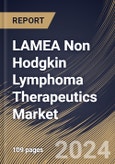Drugs like ibrutinib and idelalisib are increasingly used in patients with relapsed or refractory NHL, providing alternative treatment options beyond traditional chemotherapy. In cases of relapse or refractory disease, high-dose chemotherapy followed by autologous stem cell transplantation may be considered salvage therapy. This approach aims to eradicate cancer cells and restore normal blood cell production. Along with active cancer-directed therapies, NHL therapeutics include supportive care measures to manage treatment-related side effects. This may include medications to alleviate nausea, prevent infections, and manage hematologic toxicities.
In advanced stages or cases where curative treatment is not feasible, NHL therapeutics, including palliative chemotherapy and symptom-focused interventions, aim to enhance quality of life by alleviating symptoms and improving overall well-being. Genomic and molecular profiling advances have led to the identification of specific genetic alterations and biomarkers associated with NHL. This information is used to guide treatment decisions, allowing for a more targeted and personalized approach. Participation in clinical trials involving novel agents, innovative immunotherapies, and experimental treatment approaches offers patients access to cutting-edge therapies and enhances NHL treatment paradigms.
Advances in understanding the genetic and molecular characteristics of NHL allow for developing targeted therapies in South Africa. Clinical trials investigate drugs targeting pathways or mutations involved in NHL progression in South Africa. Clinical trials involve discovering and validating biomarkers that can help predict treatment response and guide personalized treatment plans for patients with NHL in South Africa. Innovations in healthcare delivery, including telemedicine and remote monitoring, are explored in clinical trials in South Africa. These approaches can improve access to care, especially for patients in remote or underserved areas in South Africa. Therefore, due to these aspects, the market will expand across the LAMEA region in upcoming years.
The Brazil market dominated the LAMEA Non Hodgkin Lymphoma Therapeutics Market by Country in 2022, and would continue to be a dominant market till 2030; thereby, achieving a market value of $301.6 Million by 2030. Argentina market is exhibiting a CAGR of 11.9% during (2023 - 2030). Additionally, The UAE market would experience a CAGR of 11% during (2023 - 2030).
Based on Cell Type, the market is segmented into B-Cell Lymphoma and T-Cell Lymphoma. Based on Therapy Type, the market is segmented into Radiation Therapy, Chemotherapy, Targeted Therapy, and Others. Based on countries, the market is segmented into Brazil, Argentina, UAE, Saudi Arabia, South Africa, Nigeria, and Rest of LAMEA.
List of Key Companies Profiled
- Pfizer Inc.
- F.Hoffmann-La Roche Ltd
- Sanofi S.A.
- AbbVie, Inc.
- Novartis AG
- GlaxoSmithKline PLC
- Johnson & Johnson (Johnson & Johnson Services, Inc.)
- Takeda Pharmaceutical Company Limited
- Bayer AG
- Bristol-Myers Squibb Company
Market Report Segmentation
By Cell Type- B-Cell Lymphoma
- T-Cell Lymphoma
- Radiation Therapy
- Chemotherapy
- Targeted Therapy
- Others
- Brazil
- Argentina
- UAE
- Saudi Arabia
- South Africa
- Nigeria
- Rest of LAMEA
Table of Contents
Companies Mentioned
- Pfizer Inc.
- F. Hoffmann-La Roche Ltd
- Sanofi S.A.
- AbbVie, Inc.
- Novartis AG
- GlaxoSmithKline PLC
- Johnson & Johnson (Johnson & Johnson Services, Inc.)
- Takeda Pharmaceutical Company Limited
- Bayer AG
- Bristol-Myers Squibb Company








